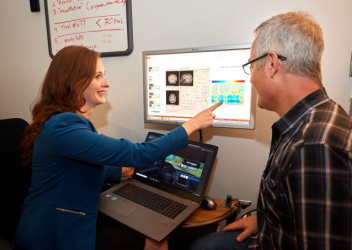Magnetoencephalography (MEG) Imaging
Magnetoencephalography, or MEG, is a non-invasive, safe, and precise imaging technique that allows researchers to learn more about how the brain works by measuring the magnetic fields produced by electrical activity in the brain. CIRP researchers specifically use this powerful brain imaging technology to probe novel cognitive processes associated with naturalistic, real-world driving situations.
The Neuroscience of Driving Program at CIRP established a novel paradigm of motor and cognitive function by partnering with the MEG Imaging Center at CHOP. They have used this approach to demonstrate differences in motor and cognitive function between autistic teens and typically developing teens. This research aims to better understand ongoing development of the brain and cognitive function during adolescence and the impact of that development on the safety of young drivers.
This MEG+Virtual Driving Assessment neuroimaging paradigm is also being used to evaluate cognitive function in a variety of clinical conditions, including concussion and brain health.
about menu
- About CIRP
-
Research
- Concussion and Brain Health
- Injury Rehab and Biomechanics Engineering
-
Road Traffic Protection
- Child Passenger Safety and Behavioral Science Research
- Crash Avoidance and Autonomous Vehicles
- Low Acceleration Time Extended Events
- Motion and Muscle Activation of Young Volunteers in Evasive Vehicle Maneuvers
- Older Driver Safety
- Pedestrian and Pedalcyclist Safety
- Completed and Foundational Research Projects
- Transportation Equity
- Traumatic Stress
- Violence Prevention
-
Young Driver Safety
- Driver Licensing and Training
- Medical Conditions and Driving
- Neurodevelopmental Differences and Driving
- Neuroscience of Driving
- Virtual Driving Assessment
-
Completed and Foundational Research Projects
- Distracted Driving
- Driver’s License and Crash Patterns
- Evaluation of Community Outreach Programs for Teen Driver Safety
- GDL Compliance and Enforcement
- Improve Teen Driver Behaviors
- National Young Driver Survey
- New Jersey GDL Decals and Vehicle Identifiers
- On-Road Assessment to Drive Safe
- Simulated Driving Assessment
- TeenDrivingPlan
- Research Tools and Data Resources
- Publications
- Training Opportunities
- Educational Resources
About CIRP
Research
Training Opportunities
Educational Resources





